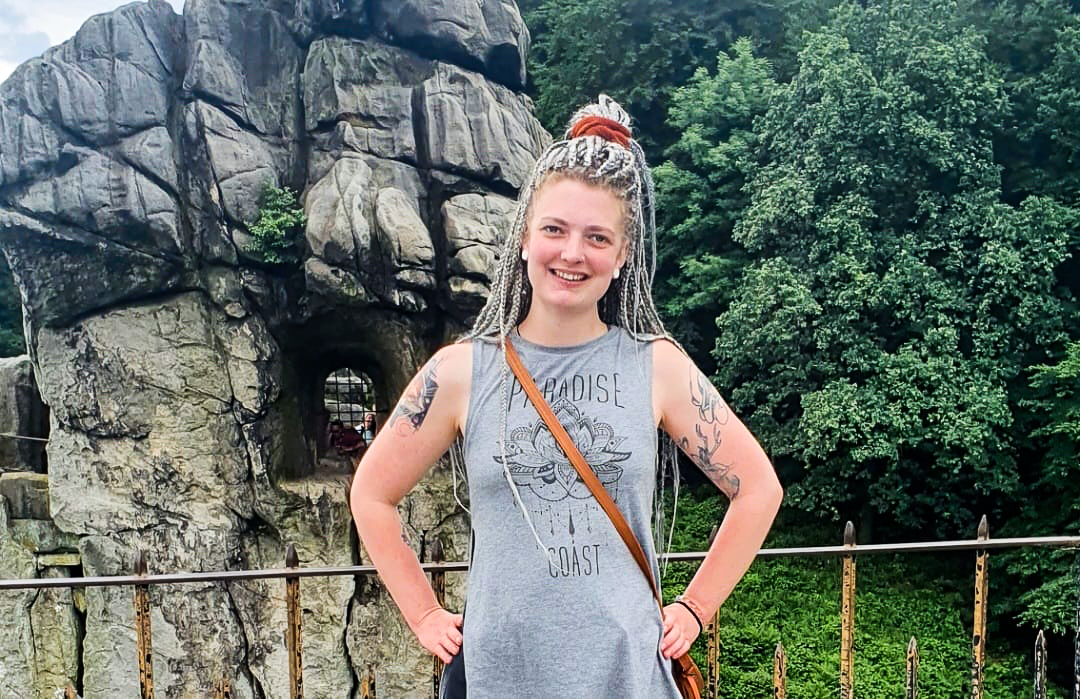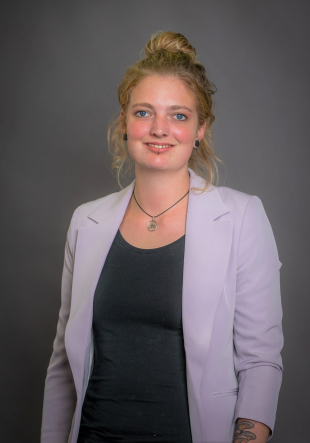What makes an internship semester in the Master of Education programme special
Franziska successfully completed her degree in teaching at vocational colleges last winter semester. In addition to German, the 26-year-old chose to specialise in economics in order to teach students at vocational colleges about economic issues in the future. Franziska is still pursuing her dream of standing in front of a class as a teacher, but has decided to continue her education at university first.
How are business processes structured and how are decisions made responsibly in companies? These and many other questions are part of the vocational specialisation in economics that the current graduate has chosen. As a teacher at a vocational college, she not only imparts specialised knowledge, but primarily helps her students to develop professional skills. Teaching at vocational colleges offers great diversity, as students are taught in many different educational programmes and age groups. It was this heterogeneous educational programme that Franziska particularly liked when choosing her subjects.
The practical semester in the Master of Education has a dual function: on the one hand, student teachers should test the theories they have previously learnt for their practical suitability and see themselves as teachers, and on the other hand, the practical semester is the prerequisite for later admission to the preparatory service, better known as traineeship. Franziska completed her practical semester in her 3rd Master's semester at a vocational college in Warburg. The 26-year-old had already received information from the PLAZ about the exact process, duration and structure so that she could then look around for suitable schools: "We were allowed to state five preferences and then we were allocated a school." For Franziska, the distance to Paderborn played a particularly important role.
One practical phase - three learning locations
- Franziska spent around 15 hours a week at the vocational college in Warburg, split over four days. Standing in front of a class and teaching herself. This special experience is the focus of the practical semester: "I was able to test myself really well in the classroom, without any assessments." Franziska was never left alone, however, as a mentor guided and advised her on how to conduct lessons. The helpful feedback sessions with her mentor remain a special memory for her. Before her first lesson, the trainee teacher was able to observe experienced teachers (also known as observing) and get to know pupils, teachers and everyday school life. And yet she was "really excited and super insecure" before her first lesson, but Franziska can encourage all students who are afraid of this very moment: "This excitement disappears after a few minutes by itself." Among other things, she passed on topics such as human labour in the company, various components of marketing and the contents of an employment contract to the students.
- In the first few weeks of the practical semester, practical introductions are carried out at the ZfsL learning location, the Centre for Practical Teacher Training. The trainers at the ZfsL continue to accompany the students during the practical school part of the practical semester in order to ask questions or carry out lesson analyses. In this way, educational issues can be dealt with or collegial case counselling can be carried out.
- At the university, the accompanying seminar "School research part of the practical semester" took place every Wednesday. This seminar includes accompanying courses in the chosen teaching subjects, i.e. German and economics in Franziska's case, as well as educational science. As part of the seminar, Franziska had to write a research paper on a school-related topic. Here, the prospective teacher examined the problem of distance learning for pupils. The coronavirus pandemic provided more than enough illustrative material in this context.
"I felt like a teacher"
Even after completing her studies, Franziska still looks back fondly on her time in the practical semester and at the vocational college in Warburg. She particularly remembers the great integration into the teaching staff, working on various school projects and familiarising herself with processes. In addition to Franziska, three other students also spent their practical semester in Warburg, so that an exciting exchange took place here too.
In order to be on site in time for the start of lessons, Franziska's days during the practical semester started early at 5 o'clock in the morning. She often used the first lesson to have a coffee in the staff room, exchange ideas and plan the following lessons. After observing or teaching her own lesson, she would reflect with her mentor before returning to Paderborn and her desk to prepare further lessons.
"Don't pretend!"
Franziska is currently working as a research assistant at Prof Dr Kremer's chair and is working in the field of business and vocational education. During her studies and also during her practical semester, the 26-year-old realised her great interest in scientific work, so she now wants to pursue this preference for the time being. However, she has not ruled out going back to school. The practical semester clearly proved to her that teaching is the right career for her. She would therefore like to advise other students to approach the practical semester with an open mind and not to pretend or put themselves under pressure. "Take everything you can with you!"
Franziska's five ultimate tips for your internship semester:
- Be open to new things!
- Show motivation and commitment!
- Always ask questions!
- See mistakes as an opportunity for further development!
- Be authentic in front of the class and in the classroom!
Is that what you want too?
More information about the M. Ed. in Economics - Teaching at Vocational Colleges


